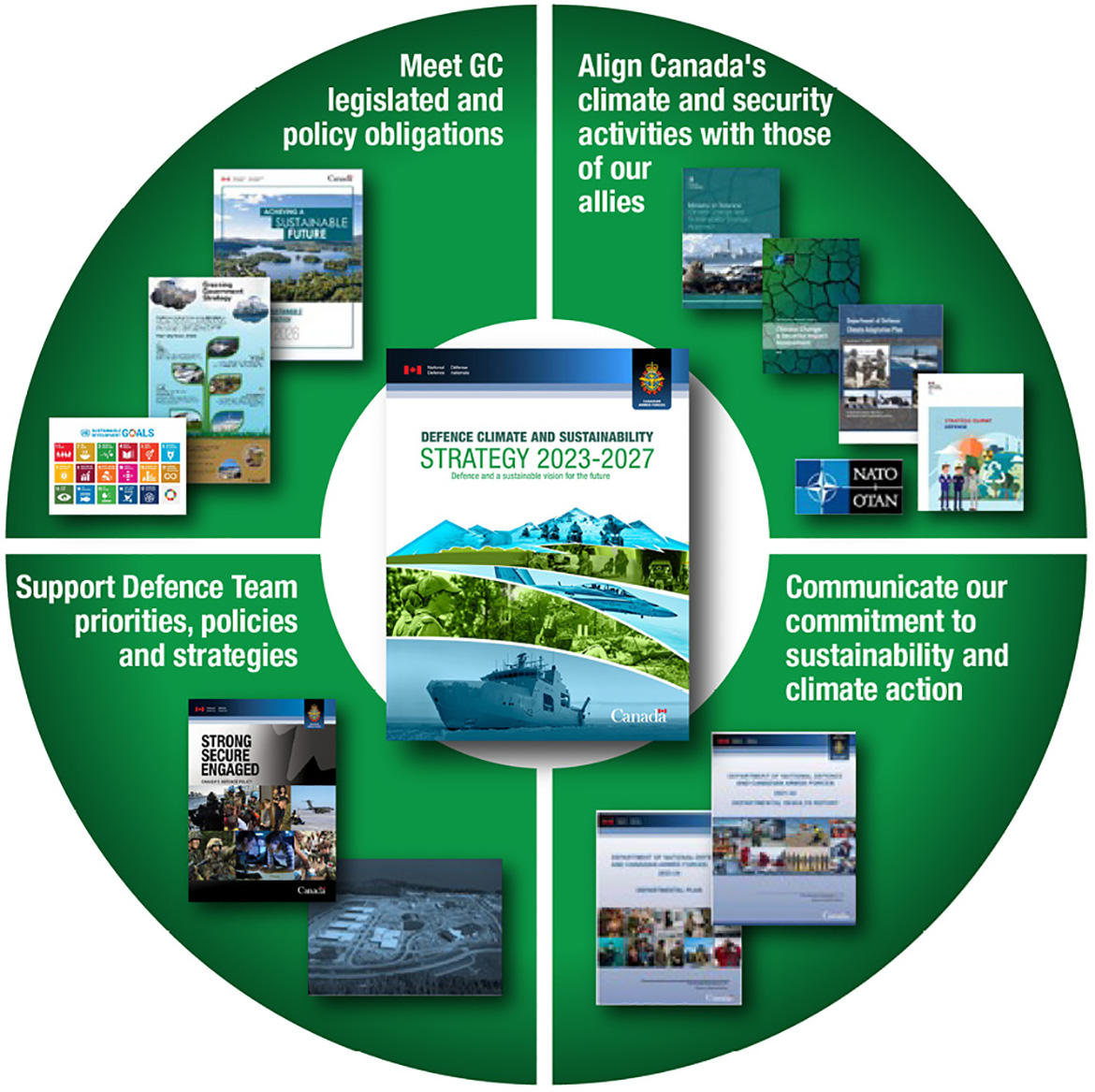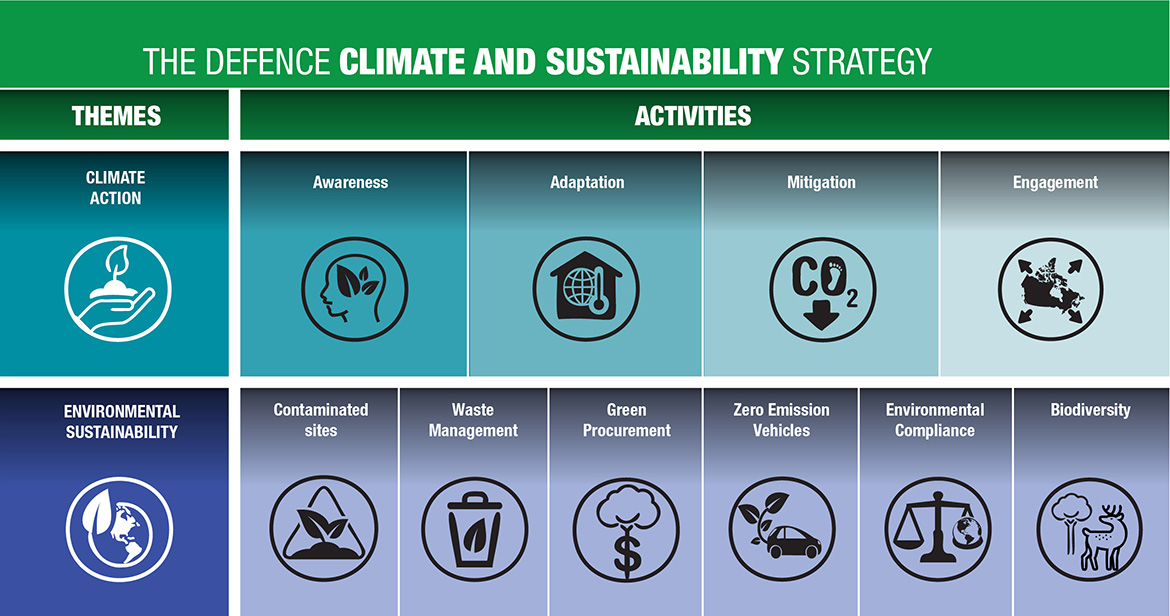1. Introduction
1.1 Sustainability and National Defence
This Defence Climate and Sustainability Strategy (DCSS) outlines the Defence Team’s plan to achieve a sustainable vision for our assets and operations, in Canada and around the world. It provides direction and renewed commitments to improve our environmental footprint and respond to a changing climate.
The DCSS is aligned with the Government of Canada’s (GC) sustainability priorities detailed in the Federal Sustainable Development Strategy (FSDS), and the requirements of the Federal Sustainable Development Act (FSDA). This includes seven principles, which must be considered in the development of the FSDS, as well as Departmental Sustainable Development Strategies.
The DCSS also supports the Greening Government Strategy (GGS), which sets the GC’s direction to transition to net-zero emissions and climate-resilient government operations, while also reducing environmental impacts beyond carbon, including on waste, water and biodiversity. The GGS also targets the federal environmental footprint, including real property, procurement and fleet modernization. As the largest owner of real property and purchaser of machinery and equipment in the federal government, it is of particular importance that we take concrete steps to reduce our environmental footprint and improve our resilience to climate change, in support of the GGS, FSDS and United Nations Sustainable Development Goals (UN SDGs).
With a core mandate to protect and defend Canadians and Canadian interests at home and abroad, the Defence Team must have a focussed approach to sustainability, while ensuring continuity of our operational readiness. The DCSS also considers the intersection of climate change and security on the national and international stage.
The DCSS articulates our commitments to help meet the GC’s greening targets, adapt to climate change, maintain sustainable real property and strengthen green procurement processes, as we continue our evolution as an environmentally sustainable and climate resilient organization.
1.2 Defence Policy
Canada’s 2017 Defence policy, Strong, Secure, Engaged (SSE), recognizes that climate change has emerged as a complex security challenge both at home and around the world. SSE includes several initiatives dedicated to enhancing our readiness and capabilities, in anticipation of increased demands on the CAF to respond to more frequent and extreme weather events exacerbated by climate change. SSE also recognizes the central role that National Defence must play in contributing to the GC’s environmental objectives.
In Budget 2022, the federal government committed to conducting a defence policy review. While this review is not yet complete, the updated policy may yield additional guidance and initiatives relevant to the DCSS.
1.3 A Sustainable Vision
1.3.1 The path travelled
The Defence Team has set out sustainability priorities and targets in support of the FSDS in previous strategies. In the last strategy, the Defence Energy and Environment Strategy 2020-2023, we committed to ambitious greening targets to support Canada’s FSDS and GGS. In our last yearly report, we made progress reducing greenhouse gas (GHG) emissions, charting pathways to reach net-zero emissions, implementing new directives and assessing defence risks related to climate change. The scorecard below shows our results.
Target |
Results |
On Track |
Achieved |
|---|---|---|---|
GHG emissions by 40% below 2005 levels by 2025 and achieve net-zero emissions by 2050 |
35.7% reduction in buildings and commercial light-duty vehicle fleet relative to a 2005 baseline. |
|
- |
Assess 75% of eligible bases or wings for an EPC and move 50% to the implementation phase by 2023 |
90% of eligible bases have been assessed for EPC implementation. 64% of eligible bases have moved to implementation phase. |
- |
|
100% of DND commercial light-duty vehicle fleet purchases will be zero-emission vehicles (ZEVs) or hybrid when available, with a ZEV procurement target of 50% by 2023 |
86% of commercial light-duty vehicles purchased were ZEVs or hybrid (limited by availability). |
- |
|
Develop a strategy for aviation fuels that supports the Government of Canada’s goal of achieving net-zero GHG emissions by 2050 |
The RCAF Path to Net-Zero Strategy was completed and approved in Feb 2023. |
- |
|
Complete baseline energy and fuel usage evaluations for select marine vessels by 2023 |
100% of the selected 7 ships have had a baseline study completed. |
- |
|
Reduce DND’s contaminated sites liability by an average of 10% per year by 2023 |
11% average reduction in contaminated sites liability over the years 2020-2023. |
- |
|
Implement a centralized geographic information system (GIS) tool for species at risk information and capture 40% of historic data by 2023 |
85% of the species at risk data has been entered into the GIS tool. |
- |
|
Listening to Canadians
In preparing the DCSS, the Defence Team considered the results of public consultations with Canadians on the draft 2022 to 2026 FSDS. We have reflected Canadians’ input in the DCSS by, for example, including the Defence Team’s approach to gender equity and our distinctions-based approach to engaging Indigenous peoples. We have incorporated new elements on climate change awareness to highlight climate literacy, research and technology, and training opportunities. We have also increased emphasis on net-zero procurement, particularly for sustainable fuel and materiel acquisition and support for our safety and security fleet, which includes military ships, vehicles and aircraft.
1.3.2 Scope of the DCSS

Caption
The DCSS aims to...
- Align Canada's climate and security activities with those of our allies
- Communicate our commitment to sustainability and climate action
- Support Defence Team priorities, policies and strategies
- Meet GC legislated and policy obligations
The DCSS has a broad scope. It aligns with federal initiatives to move the country in a common direction. It supports the department’s priorities, policies and strategies. It is the vehicle to communicate the Defence Team’s commitment to action and sustainable progress on climate and security. Finally, the DCSS recognizes the importance of working with allies and partners and the broader global effort to reduce the impacts of climate change.

Caption
- Goal 10: Advance reconciliation with Indigenous Peoples and take action to reduce inequality
- Goal 12: Reduce waste and transition to zero-emis-sion vehicles
- Goal 13: Take action on climate change and its impacts
The DCSS advances our environmental activities in alignment with the UN Sustainable Development Goals (SDGs), and the FSDS goals. Defence is responsible for responding to the following FSDS goals; Goal 10 advance reconciliation with Indigenous peoples and take action to reduce inequality, Goal 12 reduce waste and transition to zero-emission vehicles and Goal 13 take action on climate change and its impacts. We have also included a commitment to support FSDS Goal 15, protect and recover species, conserve Canadian biodiversity.
The DCSS is organized under two broad themes, climate action and environmental sustainability, which are aligned with the UN SDGs, FSDS goals and the NATO Climate Change and Security Action Plan.

Caption
The Defence Climate and Sustainability Strategy Themes
- Themes
- Climate Action
- Activities
- Awareness
- Adaptation
- Mitigation
- Engagement
- Activities
- Climate Action
- Themes
- Environmental Sustainability
- Activities
- Contaminated sites
- Waste Management
- Green Procurement
- Zero Emission Vehicles
- Environmental Compliance
- Biodiversity
- Activities
- Environmental Sustainability
These themes contain actions, targets and foundational knowledge to help us reach our goals and increase our sustainability, resilience and environmental performance. More details on targets and alignment with the UN SDGs and FSDS can be found in the Appendix.
The Defence Team will continue to ensure that our decision-making considers FSDS goals and targets, through Gender Based Analysis Plus (GBA Plus) and strategic environmental assessment analyses.
GBA Plus is an analytical tool to assess systemic inequalities and ensure an intersectional lens is applied to all policies, programs and initiatives, including those pertaining to the environment, to support diverse groups in Canada equitably. This analysis considers biological (sexes) and socio-cultural (gender) differences, as well as other identity factors such as race, ethnicity, religion, age, mental or physical disability.
When a Defence Team initiative undergoes a detailed strategic environmental assessment, we make a public statement to demonstrate that we considered the environmental impacts (including on FSDS goals and targets) of the approved policy, plan or program, and how we will mitigate them.
The Defence Team integrates environmental considerations in our decision-making by implementing the Impact Assessment Act (IAA), and through project planning and management, and departmental business processes.
Both a strategic environmental assessment and GBA Plus analysis have been completed for this strategy.
1.4 Advancing Reconciliation
The GC is committed to advancing reconciliation with Indigenous peoples across Canada. National Defence joins our federal partners in a whole-of-government approach to advancing and renewing the rights of First Nations, Inuit and Métis, to continue to build relationships and listen to Indigenous priorities.
In June 2023, Canada released its first United Nations Declaration on the Rights of Indigenous Peoples Act Action Plan. This action plan is a starting point for ongoing consultation and cooperation with Indigenous partners and reflects another important step on our journey of reconciliation. To help align our operations with the Act, we launched the Indigenous Reconciliation Program, which supports collaboration and dialogue between Indigenous partners and National Defence.
To support FSDS Goal 10, the Defence Team is committed to renewing and strengthening our relationships with Indigenous peoples across Canada in the communities where we operate. We regularly engage First Nations, Inuit and Métis governing bodies and organizations on planned projects, training exercises and military activities, particularly when they could affect Indigenous rights, lands and water. We have included our departmental actions toward reconciliation in the Department of National Defence and Canadian Armed Forces Departmental Plan 2023 - 2024.
We have heard our Indigenous partners’ concerns about the challenges posed by climate change and the shifting geopolitical context, particularly in the North and Arctic. This underscores the need to continue to advance our shared priorities and ensure Indigenous communities have meaningful opportunities for dialogue and participation in Defence activities and projects across the country.
1.5 The Road Ahead
On the road ahead, the Defence Team is focused on evolving as a sustainable security organization. This means adapting to a changing climate while remaining focused on our environmental footprint. To this end we must enable a ready military force, capable of sustainably planning for and responding to climate and security challenges at home and abroad.